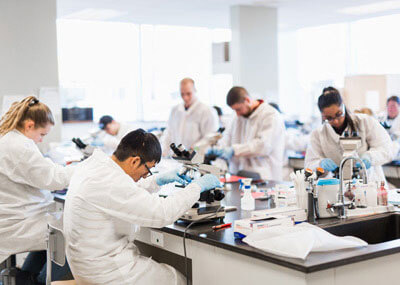
Biochemistry is the branch of science that explores the chemical processes within and related to living organisms. It combines principles from both biology and chemistry to understand the molecular mechanisms that drive biological processes. Here's an overview of what you might expect to cover in a typical biochemistry course:
Course Outline:
1. Introduction to Biochemistry
- Definition and scope of biochemistry
- Historical development of biochemistry
- Importance of biochemistry in medicine, agriculture, and industry
2. Cell Structure and Function
- Structure and function of cell organelles
- Cell membranes and transport mechanisms
- Energy production in cells (ATP synthesis)
3. Proteins
- Amino acids and peptide bonds
- Protein structure and folding
- Enzyme kinetics and mechanisms
- Protein synthesis and regulation
4. Carbohydrates
- Monosaccharides, disaccharides, and polysaccharides
- Glycolysis, gluconeogenesis, and glycogen metabolism
- Regulation of blood sugar levels
5. Lipids
- Fatty acids, triglycerides, and phospholipids
- Lipid metabolism and its regulation
- Membrane structure and function
6. Nucleic Acids
- Structure of DNA and RNA
- DNA replication, transcription, and translation
- Genetic code and protein synthesis
7. Enzymes
- Enzyme classification and nomenclature
- Enzyme kinetics, inhibition, and regulation
- Mechanisms of enzyme action
8. Vitamins and Cofactors
- Classification of vitamins
- Role of vitamins as coenzymes and antioxidants
- Deficiency diseases
9. Bioenergetics and Metabolism
- Energy currency of the cell (ATP)
- Aerobic and anaerobic respiration
- Metabolic pathways: glycolysis, TCA cycle, and oxidative phosphorylation
10. Hormones and Signal Transduction
- Types and functions of hormones
- Hormone-receptor interactions
- Signal transduction pathways
11. Techniques in Biochemistry
- Spectroscopic methods (UV-Vis, IR, NMR)
- Chromatography and electrophoresis
- Enzyme assays and molecular biology techniques
Assessment Methods:
- Lectures and Tutorials: Traditional classroom teaching and discussions
- Laboratory Work: Practical sessions to perform experiments and understand techniques
- Assignments and Projects: Research-based assignments, presentations, and group projects
- Examinations: Midterm and final exams to assess theoretical and practical knowledge
Recommended Textbooks:
- "Lehninger Principles of Biochemistry" by Nelson and Cox
- "Biochemistry" by Voet, Voet, and Pratt
- "Molecular Biology of the Cell" by Alberts et al.
Career Opportunities:
- Research Scientist
- Biotechnologist
- Clinical Biochemist
- Pharmaceutical Scientist
- Nutritionist
- Academician/Teacher
This is a general outline, and the specific topics covered and their depth can vary depending on the level of the course (undergraduate or graduate) and the institution offering it.
